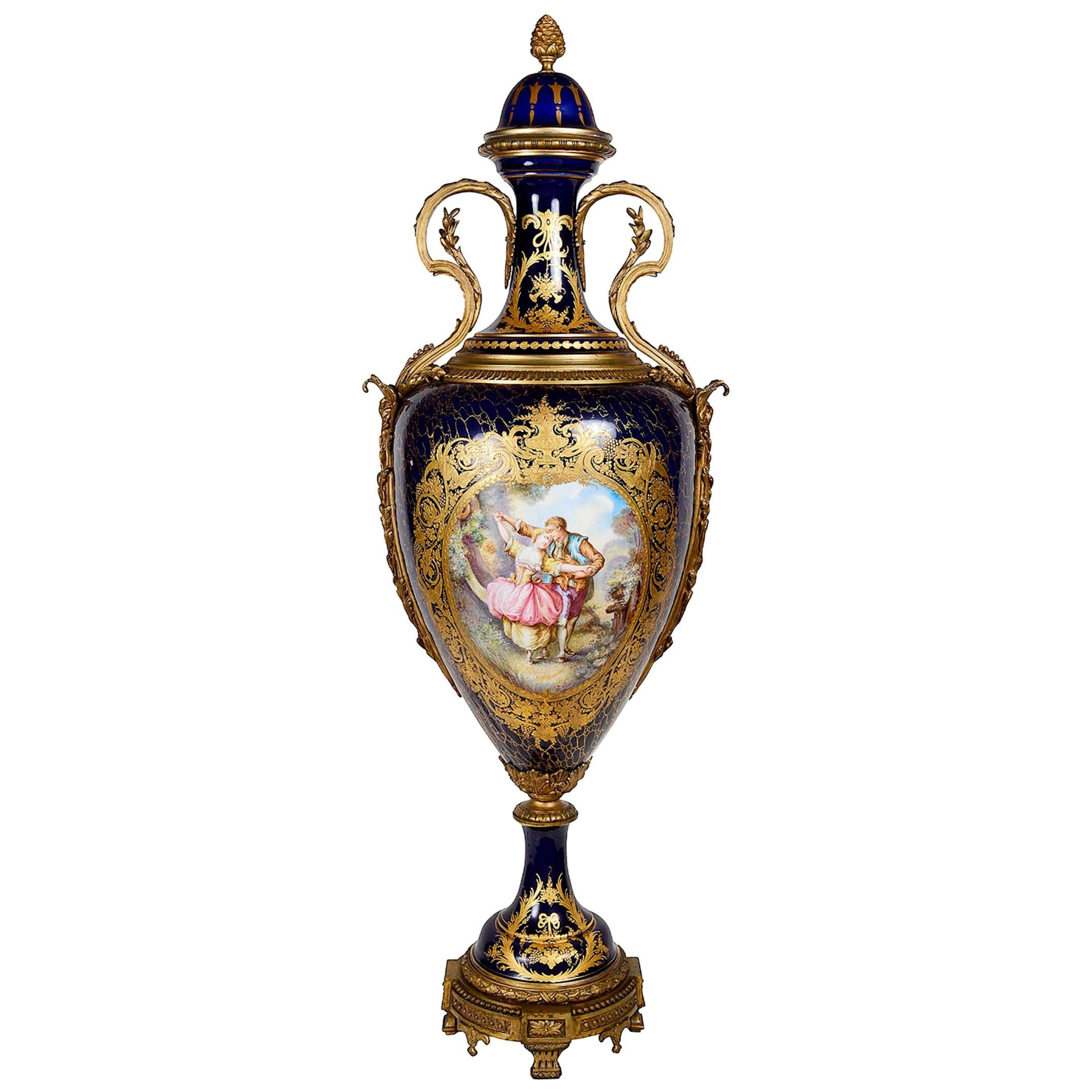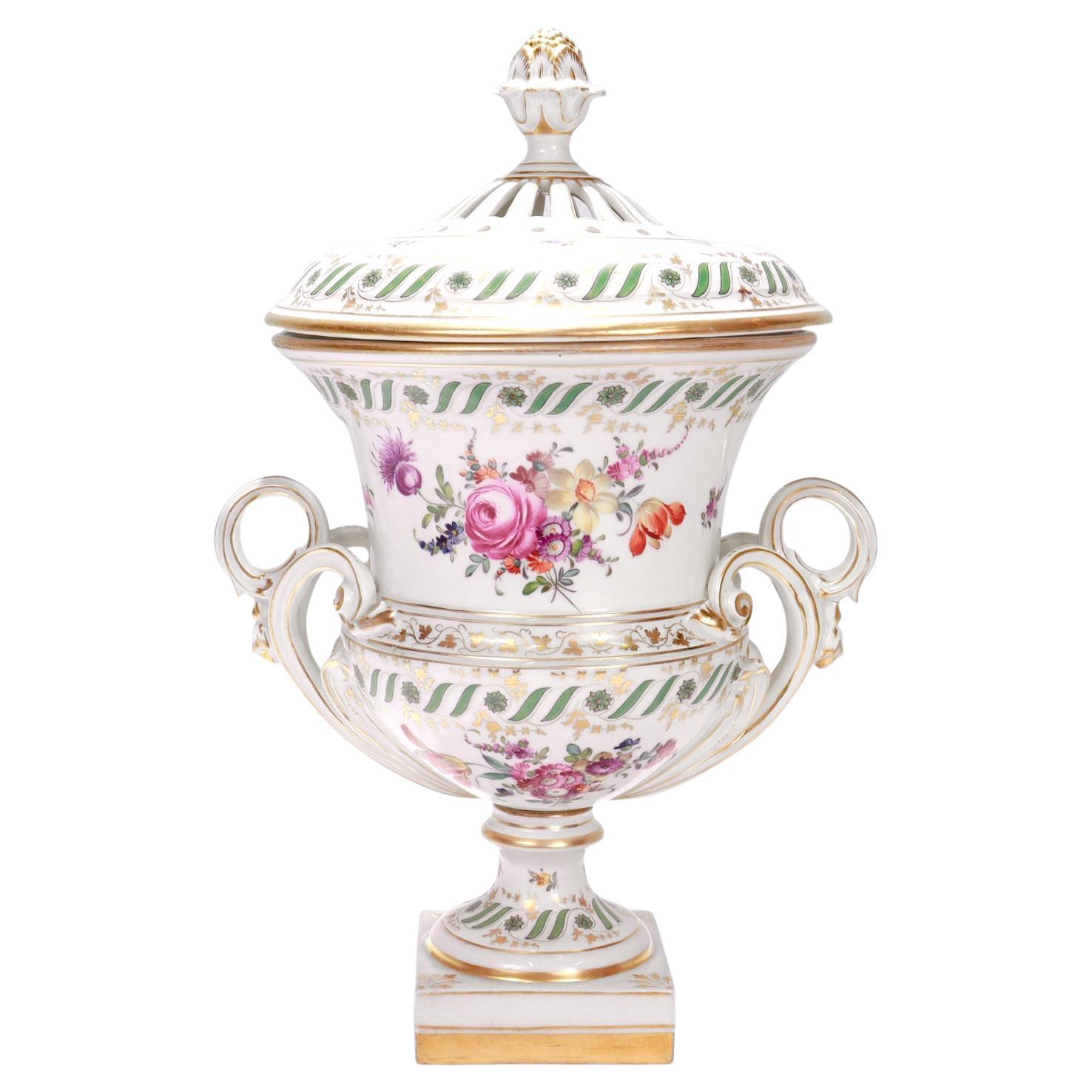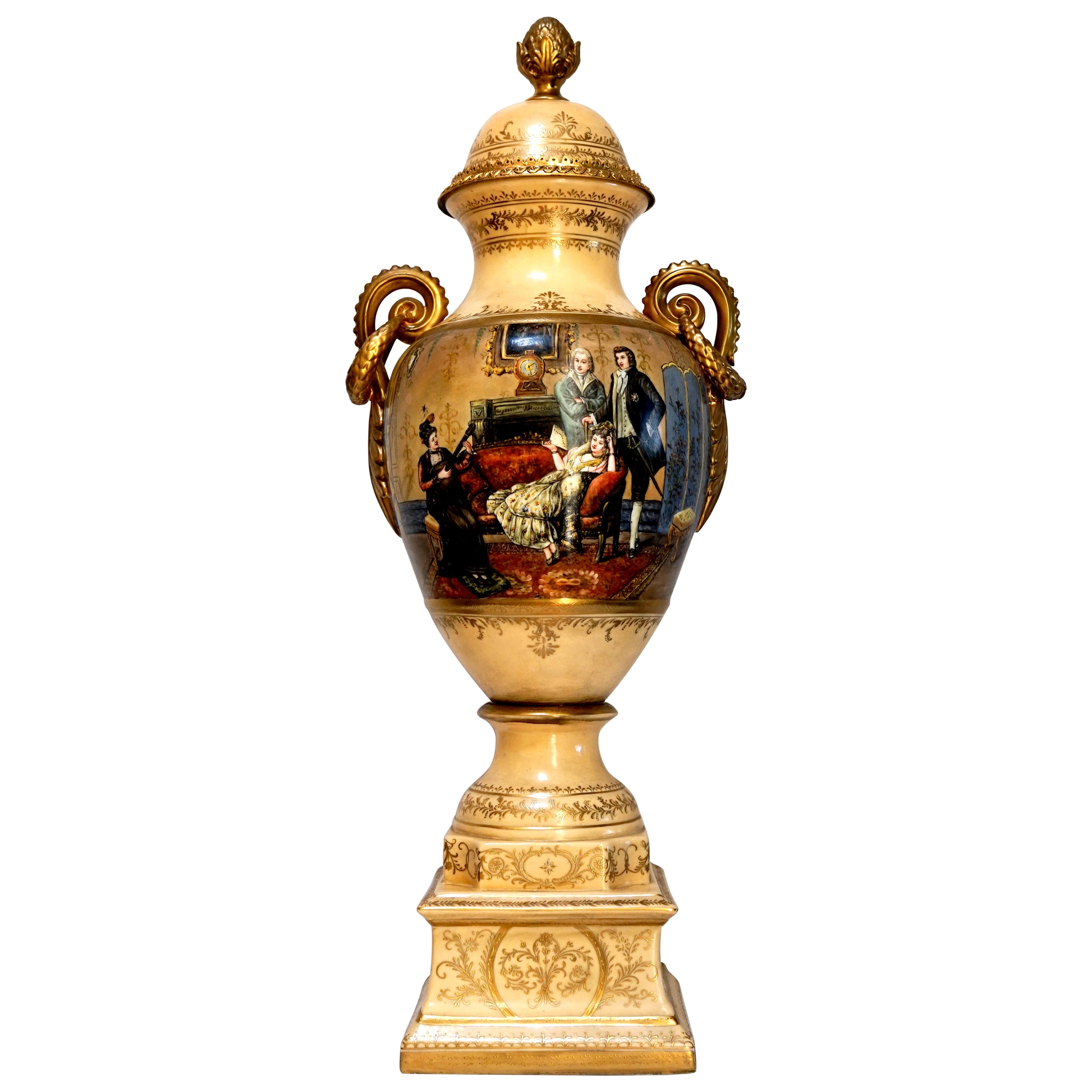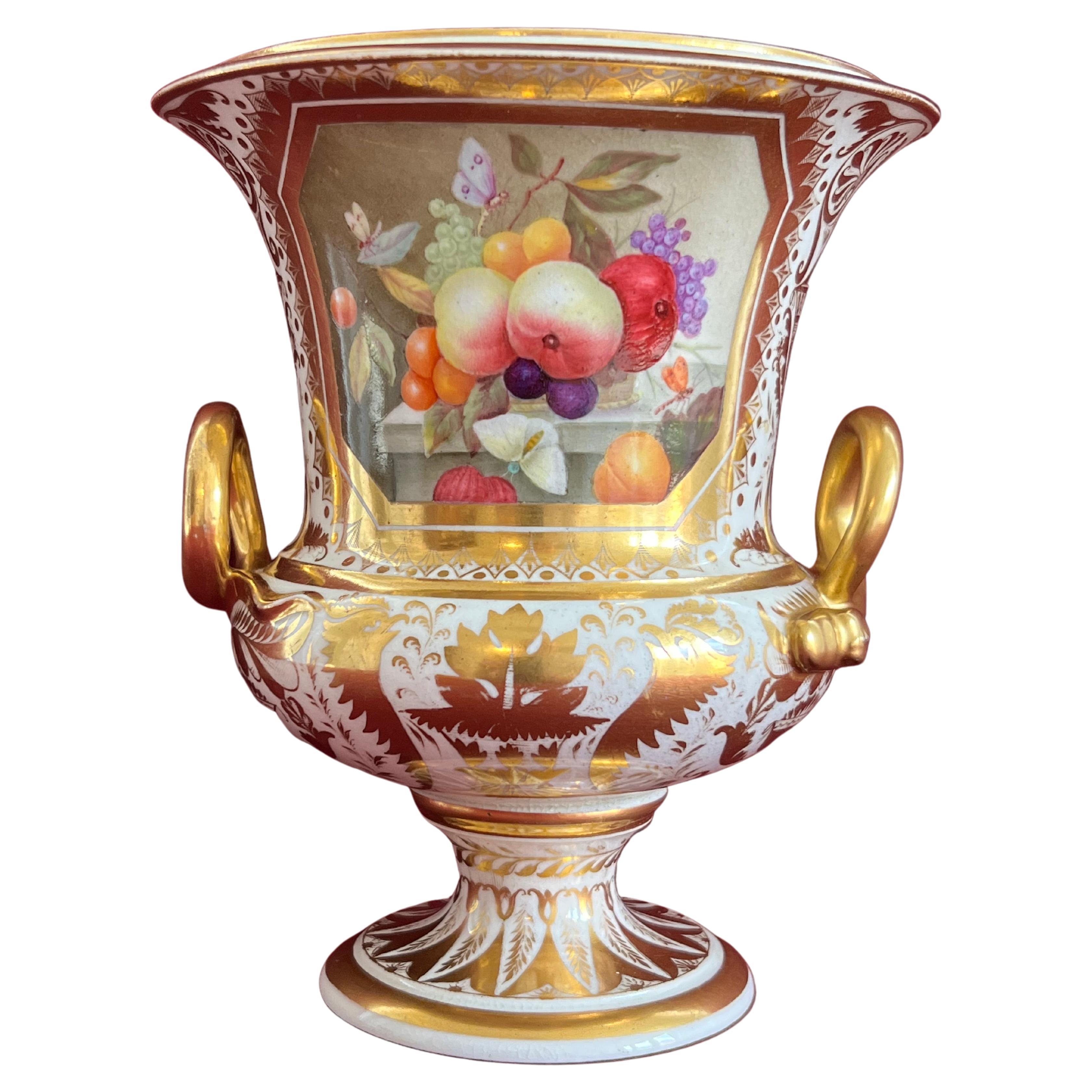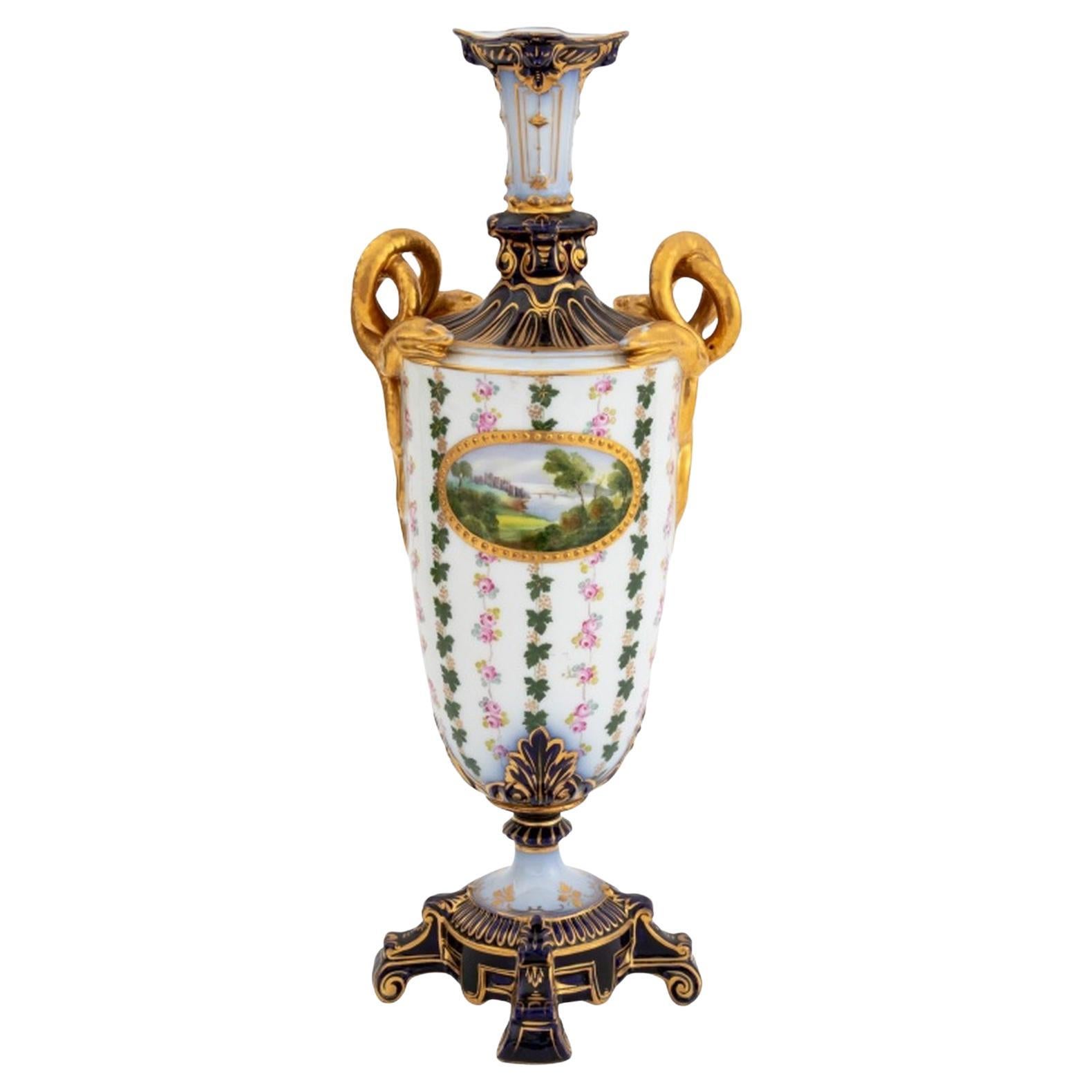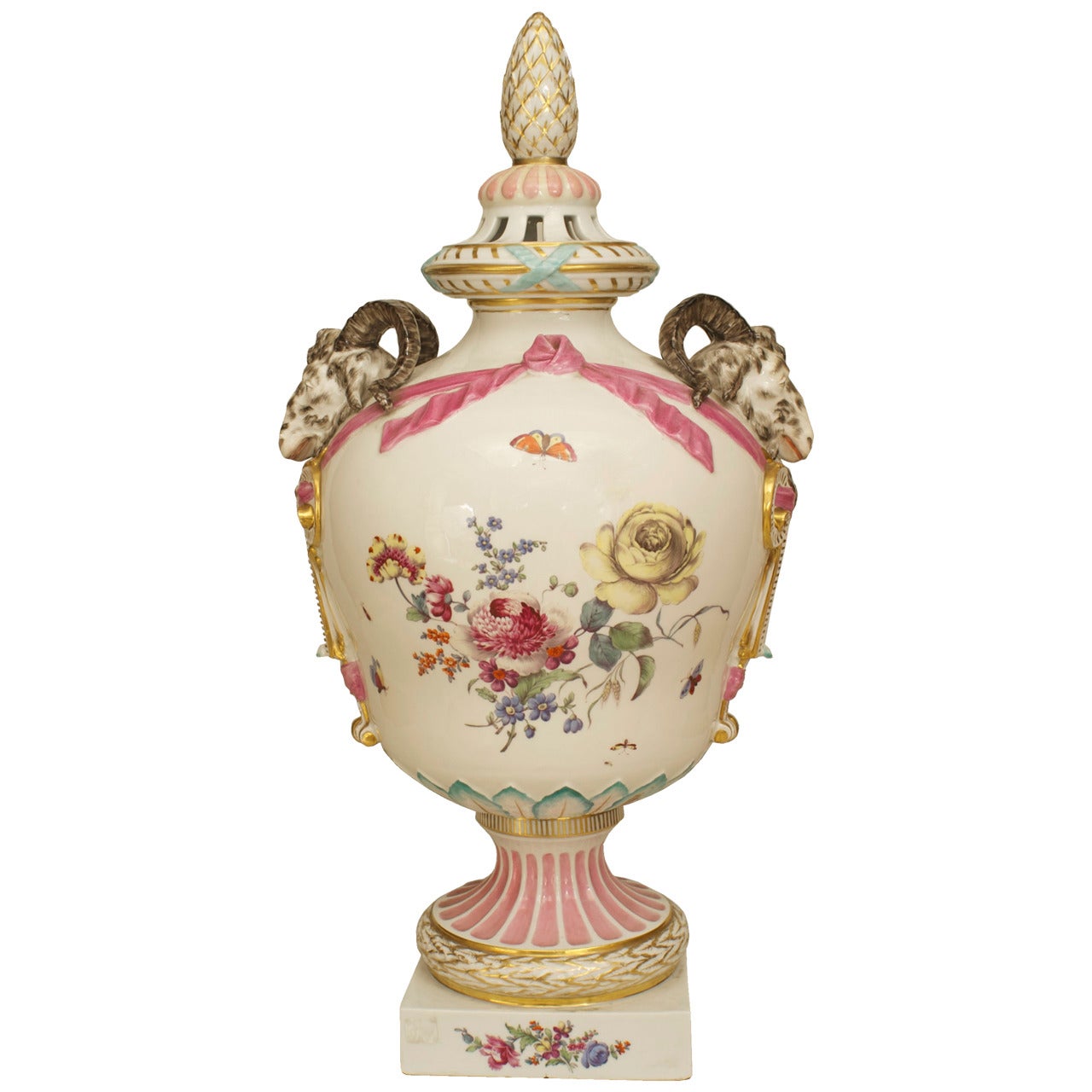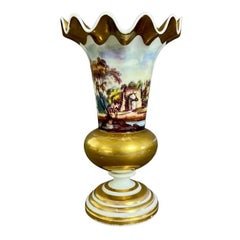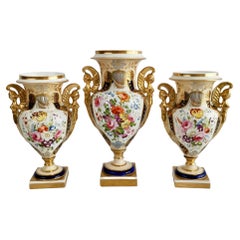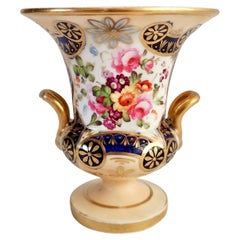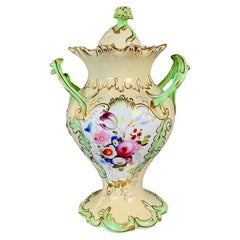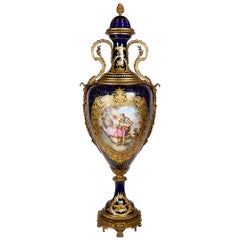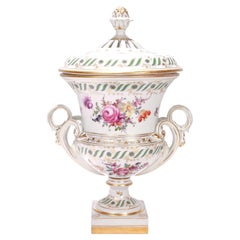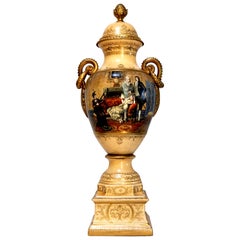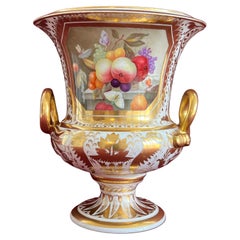Items Similar to Chelsea-Derby Vase and Cover, Zachariah Boreman and Richard Askew, 1783-1784
Want more images or videos?
Request additional images or videos from the seller
1 of 17
Chelsea-Derby Vase and Cover, Zachariah Boreman and Richard Askew, 1783-1784
$3,750per set
£2,831.66per set
€3,264.63per set
CA$5,292.84per set
A$5,834.35per set
CHF 3,052.81per set
MX$71,585.64per set
NOK 38,428.82per set
SEK 35,937.02per set
DKK 24,369.46per set
About the Item
This is a very rare and stunning vase with cover made by Chelsea-Derby in 1783-1784. The pear-shaped vase stands on a square foot and has two handles with moulded floral chains, and a pointed cover. Set in a gilt striped ground with palmette borders, one side bears a fine landscape by Zachariah Boreman; the other the figure of a muse inscribed HISTORY by Richard Askew.
The Derby Porcelain factory has its roots in the late 1740s, when Andrew Planché, a Walloon Huguenot refugee, started making simple porcelain toys shaped like animals in his back yard. In 1756 Staffordshire enameller William Duysbury and banker John Heath started a new porcelain factory with Planché and this was to grow out to the largest factory of its time, buying up the bankrupted Chelsea and Bow factories, as well as the stock of several other workshops including that of James Giles. The combination of various traditions, porcelain making skills and sophisticated clients enabled Duesbury to create one of the best porcelain factories of the 18th and 19th Centuries, which after many ups and downs is still operative today. The period between the purchase of the Chelsea factory in 1770 and ca 1784 is called the Chelsea-Derby era, when many items were created in Derby and decorated in Chelsea. The purchase of Chelsea not only brought in many moulds to Derby, but, importantly, some highly skilled artists, among whom were Zachariah Boreman and Richard Askew.
Zachariah Boreman became one of the most celebrated painters at Derby. Born in London in 1738, he arrived at Derby around 1774 after working at Chelsea, and remained until 1794, when he left in frustration with Michael Kean, the owner. Even though Boreman became one of the prime landscape painters at Derby, Kean would not pay him more and this caused Boreman to go back to London and work for the Simms decorating studio until his death in 1810. Boreman was known as a highly respected and likable person, and he became famous for his fine landscapes. His style was most probably influenced by Paul Sandby, the chief drawing instructor at the Royal Military Academy at Woolwich. His little landscapes are restrained, with often muted brown and green shades; in Boreman's landscapes, less is more although his drawing and stippled brush style is extraordinarily detailed.
Richard Askew (ca 1730-1798) was another one of the famous artists who came from Chelsea and then moved to Derby in about 1772. He didn't only work for Chelsea and Derby, but also worked on a freelance basis for many others, and there is evidence that he advertised himself all over Britain and Ireland as a miniature painter. In 1781 Askew returned to London, and later also worked in Birmingham. Askew became known for his many paintings of figures such as muses and, in particular, cherubs. His paintings are usually in the pink tint you can see on this beautiful vase, and they are easily recognisable by their heavy limbs and jowls. This vase would probably have belonged to a garniture of various vases, each with a different muse. This muse is called HISTORY, and she holds a book in one hand, a trumpet in the other.
The vase is marked with the inscribed number 69 and a gilt anchor mark on the side of the foot.
DOCUMENTATION: A pair of muse and landscape vases in similar style, painted by the same artists, can be seen in colour plate 10 on page 46 of John Twitchett's "Derby Porcelain 1748-1848 An Illustrated Guide".
CONDITION REPORT The vase is in excellent condition with only two minor flaws: the cover is invisibly restored, and there are some minor scratches as visible in the pictures. Other than this, there is no damage, repairs or crazing. During production someone accidentally put their thumb into the ridge around the belly of the vase; this dent has been ignored by the maker and gilded over... these little accidents happen to the best of us!
Antique British porcelain is never perfect. Kilns were fired on coal in the 1700s, and this meant that china from that period can have some firing specks from flying particles. British makers were also known for their experimentation, and sometimes this resulted in technically imperfect results. Due to the shrinkage in the kiln, items can have small firing lines or develop crazing over time, which should not be seen as damage but as an imperfection of the maker's recipes, probably unknown at the time of making. Items have often been used for many years and can have normal signs of wear, and gilt can have signs of slight disintegration even if never handled. I will reflect any damage, repairs, obvious stress marks, crazing or heavy wear in the item description but some minor scratches, nicks, stains and gilt disintegration can be normal for vintage items and need to be taken into account.
There is widespread confusion on the internet about the difference between chips and nicks, or hairlines and cracks. I will reflect any damage as truthfully as I can, i.e. a nick is a tiny bit of damage smaller than 1mm and a chip is something you can easily see with the eye; a glazing line is a break in the glazing only; hairline is extremely tight and/or superficial and not picked up by the finger; and a crack is obvious both to the eye and the finger. Etcetera - I try to be as accurate as I can and please feel free to ask questions or request more detailed pictures!
DIMENSIONS 29cm (11") tall incl. cover; 14.5cm (5.75") wide incl. handles.
- Creator:
- Dimensions:Height: 11 in (27.94 cm)Diameter: 5.75 in (14.61 cm)
- Sold As:Set of 2
- Style:George III (Of the Period)
- Materials and Techniques:
- Place of Origin:
- Period:1780-1789
- Date of Manufacture:1783-1784
- Condition:Repaired: invisible professional repair to cover. Wear consistent with age and use. In excellent antique condition, invisible repair to cover, a few minor scratches, otherwise perfect.
- Seller Location:London, GB
- Reference Number:Seller: A-CHE091stDibs: LU4805142630652
About the Seller
5.0
Vetted Professional Seller
Every seller passes strict standards for authenticity and reliability
Established in 2016
1stDibs seller since 2019
226 sales on 1stDibs
Typical response time: 2 hours
- ShippingRetrieving quote...Shipping from: London, United Kingdom
- Return Policy
Authenticity Guarantee
In the unlikely event there’s an issue with an item’s authenticity, contact us within 1 year for a full refund. DetailsMoney-Back Guarantee
If your item is not as described, is damaged in transit, or does not arrive, contact us within 7 days for a full refund. Details24-Hour Cancellation
You have a 24-hour grace period in which to reconsider your purchase, with no questions asked.Vetted Professional Sellers
Our world-class sellers must adhere to strict standards for service and quality, maintaining the integrity of our listings.Price-Match Guarantee
If you find that a seller listed the same item for a lower price elsewhere, we’ll match it.Trusted Global Delivery
Our best-in-class carrier network provides specialized shipping options worldwide, including custom delivery.More From This Seller
View AllSamuel Alcock Rare Porcelain Vase, Wave Edge, Continuous Fine Landscape, ca 1826
By Samuel Alcock & Co.
Located in London, GB
An extremely rare wave edge vase on a round foot with superb continuous landscape painting of a river scene with ruins and two figures, rich gilding on the upper edge, ball and foot....
Category
Antique 1820s English Regency Vases
Materials
Porcelain
English Garniture of 3 Vases, Empire Style, Provenance G.Godden, 1810-1815
By Ridgway Porcelain
Located in London, GB
This is a spectacular garniture of three vases made by an English factory between 1810 and 1815. The vases are made in the French Empire style with heavily gilded Egyptian caryatid s...
Category
Antique 1810s English Regency Vases
Materials
Porcelain
Staffordshire Porcelain Campana Vase, Salmon, Gilt and Flowers, circa 1820
By Staffordshire
Located in London, GB
On offer is a very fine small porcelain campana vase made circa year 1820 by an unknown Staffordshire potter. The vase has a beautiful delicate salmon colored ground, rich gilding an...
Category
Antique 1820s English Regency Vases
Materials
Porcelain
Samuel Alcock Potpourri Vase, Green, Double Cover, Landscape, Flowers, ca 1835
By Samuel Alcock & Co.
Located in London, GB
A potpourri vase with double cover, pale yellow/beige ground with apple green details, Rococo shape with fruit finial and scroll handles and foot; a flower reserve on one side and a ...
Category
Antique 1830s English Rococo Revival Vases
Materials
Porcelain
$860 / set
Free Shipping
Samuel Alcock Vase, Wave-Edge, Cobalt Blue, Rich Gilt, Flower Reserve, ca 1825
By Samuel Alcock & Co.
Located in London, GB
A wave-edge vase in cobalt blue and rich gilt decoration with a finely painted reserve with floral garden scene on the front; rich gilding on upper edge, ball, square foot and fine t...
Category
Antique 1820s English Regency Vases
Materials
Porcelain
Samuel Alcock Vase, Wave-Edge, Maroon, Rich Gilt, Flower Reserve, ca 1825
By Samuel Alcock & Co.
Located in London, GB
A wave-edge vase in deep maroon and rich gilt decoration with a finely painted reserve with floral garden scene on the front; rich gilding on upper edge, ball, square foot and fine t...
Category
Antique 1820s English Regency Vases
Materials
Porcelain
You May Also Like
Large 19th Century Sèvres Style Porcelain Lidded Vase
By Manufacture Nationale de Sèvres
Located in Brighton, Sussex
A wonderful quality late 19th century French 'Sevres' style hand painted porcelain lidded vase. Having a cobalt blue ground, classical scrolling ...
Category
Antique Late 19th Century French Louis XVI Vases
Materials
Porcelain
Antique Carl Thieme Potschappel German Porcelain Dresden Style Covered Urn
By Carl Thieme
Located in Philadelphia, PA
A fine Dresden style covered urn.
By Carl Thieme / Potschappel porcelain factory.
Of Campagna urn form with scrolling twin handles and a pierced lid or cover with stylized artichoke finial.
Decorated throughout with typical Deutsche Blumen floral sprays, bands of green flower head and s-scroll devices, and rich gilding throughout.
Fully marked to the base.
Simply a wonderful antique porcelain urn!
Date:
Late 19th or Early 20th Century
Overall Condition:
It is in overall good, as-pictured, used estate condition.
Condition Details:
The base has apparently been re-secured at one point with overpaint to the bolt. (One can twist the base to rest firmly in place, but it can rotate the other direction to loosen some.) Otherwise, there are some fine & light surface scratches and other signs of expected light wear consistent with age.
Maker:
Carl Thieme / Potschappel
Pattern Name:
Dresden Potpourri...
Category
20th Century German Rococo Urns
Materials
Porcelain
Gilt Porcelain Large Dresden Two Handled Garniture Vase and Cover
By Dresden Porcelain
Located in Lomita, CA
The porcelain factories of Dresden are renowned for this type of decorative piece and this monumental vase would have been at least one of a pair or part of a three or five piece mantle garniture at some point in its history. Alone, it is stunning. It is hand painted, but the painting is minimal when compared to other earlier examples, especially from the Meissen factory. This covered urn
was created in Germany with colorful scenes during the early 20th Century.
The covered lid surmounted by a gilt metal foliate finial, the baluster body with two scrolled gilt metal handles painted with a detailed figural setting in a salon with two couples listening to musical instruments their companions play within gilt ecru encrusted borders. Beautiful.
This type of porcelain became collectible in the 1960s and reached the height of the market in the 1990s. Since then, fashions have changed greatly, but this is still a statement piece that endures in wonderful condition. and so prices have fallen quite dramatically especially in a traditional auction. However, this is still an impressive piece, signed indistinctly, on a circular socle atop a square raised plinth base. Marked with the underglaze blue Dresden mark...
Category
Early 20th Century German Rococo Revival Urns
Materials
Ceramic, Porcelain
$3,080 Sale Price
20% Off
Fine Derby Porcelain Vase C.1815 Decorated in the Manner of Thomas Steele
By Derby
Located in Exeter, GB
A very fine Derby porcelain campana shaped vase c.1815. Beautifully painted with two panels of fruit in the manner of Thomas Steele. This artist was one ...
Category
Antique 1810s English Vases
Materials
Porcelain
$1,377 Sale Price
20% Off
German Porcelain Two Handle Vase
Located in Astoria, NY
German Porcelain Two Handle Vase, late 19th century, with snake entwined handles, oval painted landscape panel, signed illegibly "A. Schu... (?)", with bands of roses and grape vine,...
Category
Antique Late 19th Century German Neoclassical Vases
Materials
Porcelain
A Fine 18th Century Continental German Porcelain Decorated Urn
Located in Queens, NY
Continental German (Berlin, late 18th Cent) porcelain pink and white decorated urn with a finial top cover and ram head sides, signed on bottom
Category
Antique Late 18th Century German Louis XVI Vases and Vessels
Materials
Porcelain
More Ways To Browse
Beautiful Antique Vase
Antique Chelsea
Green Vase Made In China
Green Vase With Figures
Painting Of Urn
Pear Vase
Antique Derby Porcelain
Richard England
Miniature Chinese Vases
Miniature Book
Antique Trumpet Vase
Gilt Book Stand
Miniature Painting Pair
18th Century George Iii Painting
Antique Cherub Painting
Antique Chelsea Porcelain
Heath Plates
Belly Vase
